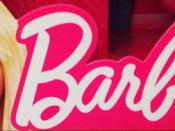Lord, M.G. "Who Is Barbie, Anyway?" 1994. Retellings: A Thematic Literature Anthology. Eds. Clarke, M.B. and A.G. Clarke. Boston: McGraw-Hill, 2004.
744-752.
"Barbie: Life in Plastic." Economist. 19 Dec. 2002. Economist.com. 2002. The Economist Group. Date accessed: 4 March, 2006.
Lord sees Barbie as representative of middle-class values and respectability. Considering the Barbie outfits and possessions you are familiar with, how would you argue that the statement is or is not true?
The comparison of Barbie to a middle class American citizen is one that is biased and unreviewed. Lord claims in her article that Barbie is a representative of the American middle class female figure, yet by studying the evidence she is in fact a giant misrepresentation of the reference group she is supposedly representing. Barbie is a care free individual with a seemingly unlimited source of income in which she uses to fund her lavish lifestyle.
Cars, clothing, Malibu townhouses on the beach. With no housework to do, no children to take care of, and no job whatsoever, Barbie is a free individual who can do whatever her heart pleases. "Barbie is charged with too glamorizing the white all-American ideal. - Barbie: Life in..." (Handout) She will never gain weight, get facial wrinkles, or lose touch with the latest trends in fashion. "Barbie has an advantage over all of them. She can never bloat. She has no children to betray her. Nor can she rot, wrinkle, overdose, or go out of style. - Lord." (746) Comparing this to the average middle class woman, the difference shown is shocking. With a nine to five job, children, and rent to pay, the female under study only wishes she could live her life as frivolously as her blond counterpart. By claiming that Barbie is middle class, or average, Lord is in fact lowering the standards and values that the middle class woman holds. Once heard that Barbie is the expected requirement of the typical female, "In many ways, this makes Barbie a toy designed by women for women to teach women what - for better or worse - is expected of them by society. - Lord." (747) By viewing what the media industry has labeled as "middle class lifestyle", the real middle classes citizens are viewing the "optimal life" and classifying themselves lower, as they do not meet the standards that are preset. Barbie is in fact subconsciously damaging the fan base that loves it so much.





